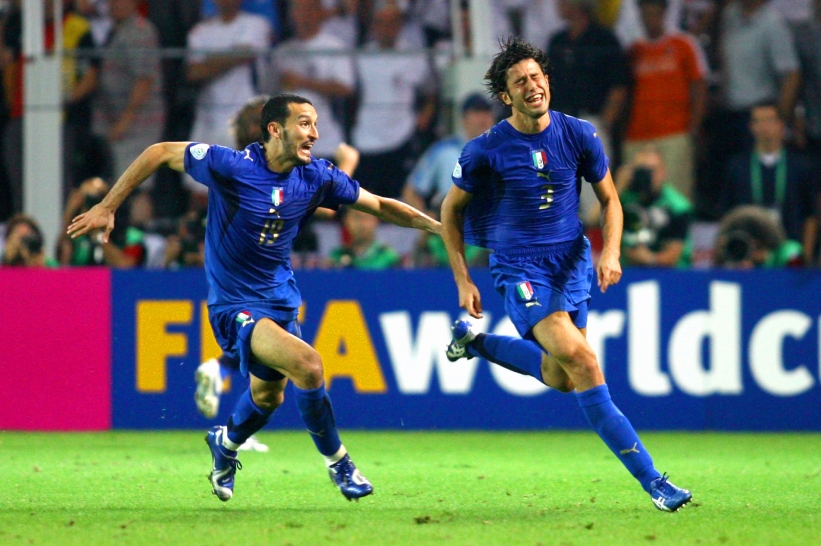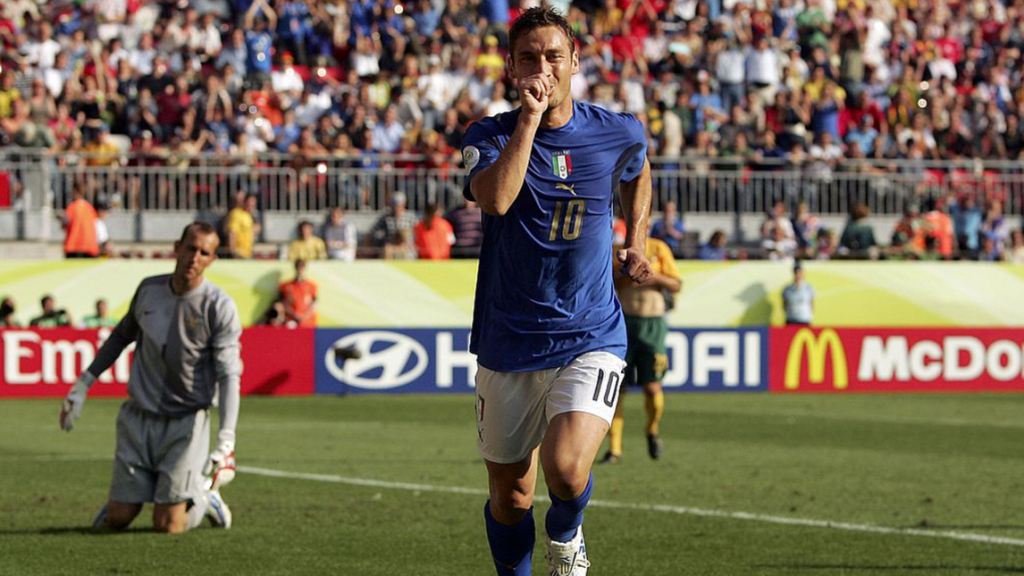“Francescooooooo! Totti! Totti! Totti!,” yelled Italian commentator Fabio Caressa. The Azzurri had just been rescued by the forward’s last gasp penalty kick against Australia, securing a spot in the quarter-finals of the 2006 World Cup.
Pessimism clouded the Italian National Team’s build up to the tournament in Germany. The fallout from ‘calciopoli’ brought a mix of shame and expectation; expectation for Marcelo Lippi’s men to perform and ultimately restore the nation’s footballing pride. What better way to turn skeptics into believers for calcio’s future than hoisting a fourth trophy for the world to see?
Lippi’s 23-man squad contained a wealth of experience in every department. Defensive stalwarts in Alessandro Nesta, future Ballon d’Or winner Fabio Cannavaro and Marco Materazzi patrolled the penalty area, guarding Gianluigi Buffon’s goal with poise and unwavering confidence. Italy’s defence emerged as the foundation for their World Cup triumph, but a balanced ‘centrocampo’ controlled proceedings and pace of play as ‘regista’ Andrea Pirlo and workhorse Gennaro Gattuso rose to the occasion with top performances. The Azzurri’s attack was equally stacked, brimming with star power and varied styles capable of breaking down any opposition; Alessandro Del Piero, target man Luca Toni, and goal poacher Pippo Inzaghi opened up the playbook for Lippi with an array of different options up front.
Italy maneuvered their way through the Group Stage comfortably ahead of Ghana, Czech Republic and the United States with a first place finish. But as meticulous, calculated and composed as the Azzurri were, they were confronted in the Round of 16 by an Australia side pushing them to their very limit. Lippi’s men were in need of a hero to stave off last 16 heartbreak.
Francesco Totti was already the King of Rome, the city he roamed as a youngster with a football rolling at his feet and a dream of playing for AS Roma engrained in his DNA. Francesco and his mother had even turned down the mighty AC Milan side of the early 1990s to remain in Rome and wear the famous Yellow and Red jersey. His love for the city, culture and his club could not be bought; the memories he’d created were not for sale.
Ahead of the 2005-06 Serie A season, Roma were a side in transition with Luciano Spalletti the new man in charge. With the hiring of the Tuscan came a new role for Totti, playing as the lone ‘false 9’ in a 4-2-3-1 formation. Before undertaking this role, the Roman played predominantly in more creative roles as a playmaker, cut from the similar ‘fantasista’ cloth as Del Piero.
Despite his changed position on the pitch, Totti’s creative juices continued flowing and he maintained his level of excellence, tucking away an impressive 15 goals in 24 Serie A appearances. But a fracture to his left fibula in late February put him at risk of missing out on the World Cup. Thankfully for Totti, a successful surgery and a series of treatments including an insertion of a metal plate accelerated his return, just in time for Roma’s Coppa Italia final with Inter, which ended in a 3-1 defeat. But more importantly, he was available for Lippi to select; ready to serve for La Nazionale.
Lippi was not short on options in the forward positions, with Del Piero, Toni, Inzaghi and Alberto Gilardino making the cut. For many coaches, Totti’s injury would have ruled them out of World Cup contention. However, the 70-year old had great faith in Totti, realising that a player with such talent could still make the difference when called upon.
Emotions ran high for Totti in the buildup to the World Cup. Yet, despite his ankle being held together with metal and screws, Itay’s No. 10 was enormously influential. There was something truly admirable about how a 29-year old Totti performed in Germany. Determined as ever to be a catalyst for his country, it was obvious that Totti would at some point be called upon to carry the nation and manager who showed the utmost faith in him. And when Italy were drawn with the Aussies in the Round of 16, Totti’s defining moment arrived.

Gol di Grosso: Italy, Germany and that night Dortmund
The game proved to be a tight affair. Italy’s early pressure failed to produce a breakthrough, with both Gilardino and Toni failing to convert presentable chances in the first-half. Then, in the 50th minute, the complexion and momentum of the tie drastically changed, with Materazzi receiving a straight red card for a rash two-footed lunge.
As the match went on, Italy’s sturdy defensive line began to unravel with the man deficit, leaving space for Australia to get in behind and force Buffon into a string of nail-biting saves. Italy, without question, were bending but they refused to break.
Afloat and still alive, Lippi looked to his bench in search of a saviour. At the 75th minute, in stepped Totti to replace Del Piero, and as we’d soon find out, Lippi’s trust was repaid. Minute by minute, time wound down and it appeared as though Italy and Australia were headed for extra time – that was until the Azzurri had were offered a lifeline.
Marauding down the left flank in the 95th minute, tournament hero Fabio Grosso did well to lose the attentions of Parma midfielder Mark Bresciano before cutting into the penalty area. He was met by Lucas Neill, who over-committed and went to ground. The Italian took a touch inside, initiating the contact and earned a penalty in dramatic, yet highly controversial, fashion.
After the official heard the pleas from the Australian players, and the penalty was upheld, Totti made that slow walk towards the spot and placed the ball down. With the fate of an entire country resting on his shoulders, Italy’s No. 10 inhaled, exhaled and struck the ball with ferocity into the top left corner to punch La Nazionale’s ticket into the final eight of the tournament. Weight lifted.
Totti’s infamous thumb-sucking celebration as he turned towards the corner flag where he was swarmed by his teammates remains forever etched in the memories of each and every Italian fan around the world. The Azzurri’s magical run in the tournament continued as they thrashed Ukraine 3-0 in the quarters and then stunned the hosts Germany with two extra-time goals from Grosso and Del Piero. In the final against France, Materazzi redeemed himself with a headed equalizer in normal time and after five more ice cold spot-kicks, Italy eventually triumphed on penalties.
12 years later, many find themselves citing that Totti penalty against Australia as the moment Italy’s destiny changed. The strike was the last for his country, as Italy’s World Cup victory marked the end of his international career. Of his nine goals for the National Team, it goes without saying that none were more significant than his penalty on June 26, 2006, at the Fritz Walter Stadion. It was a goal that breathed new hope, life and belief into the dream of becoming ‘Campioni del Mondo’. And for that, Italians will never forget the ‘Rigore Totti’ that kept a nation dreaming.
Words by Matt Santangelo: @Matt_Santangelo

